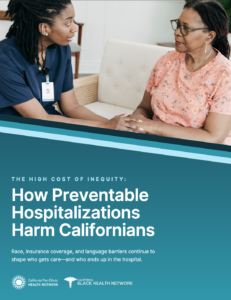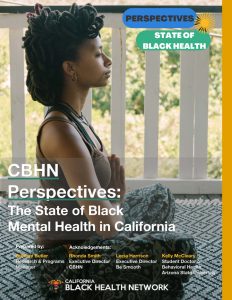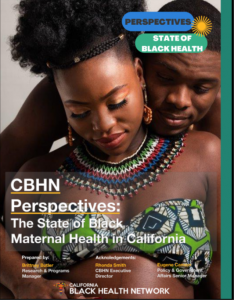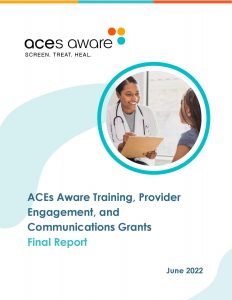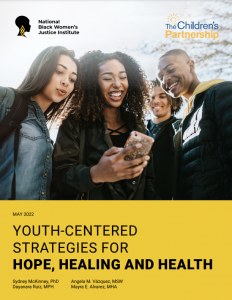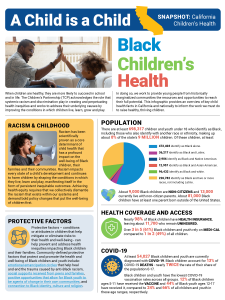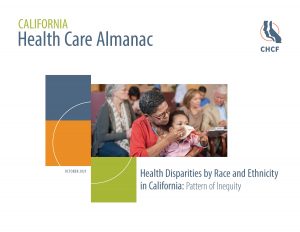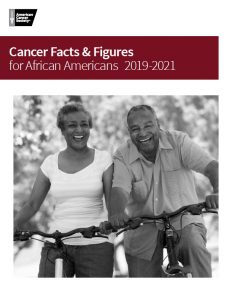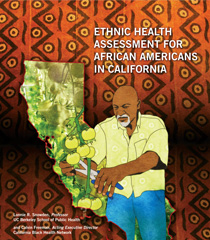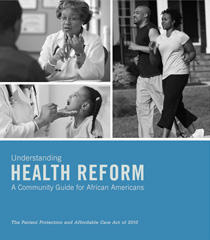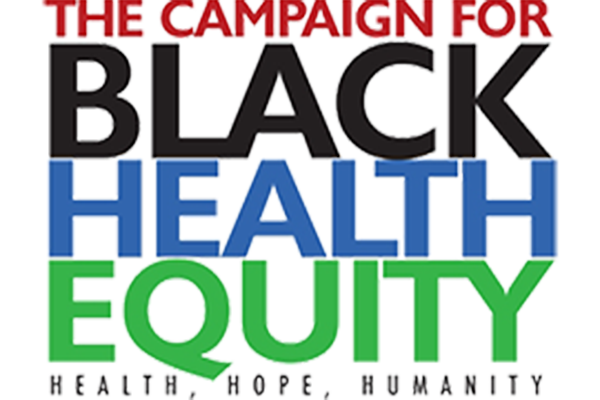How Preventable Hospitalizations Harm Californians
This CPEHN Perspectives report explores the urgent question: “Why are certain Californians ending up in the hospital for conditions that should’ve been prevented?” Drawing from 2021 data, the report reveals that race, insurance type, and language barriers deeply impact access to care—putting Black, AIAN, and non-English-speaking Latine and AAPI communities at highest risk. With over $3.5 billion spent annually on preventable hospital stays, this report urges systemic solutions: invest in culturally responsive primary care, protect Medi-Cal, and reduce structural barriers before more lives—and dollars—are lost.
CBHN Perspectives: The State of Black Health
The California Black Health Network presents CBHN Perspectives: The State of Black Health, a series of reports that highlight health, economic, social, and policy issues that impact Black communities in California and the United States. The CBHN Perspectives reports feature data and insights that describe Black Health and compares the state of health by race and ethnicity. From mental health to COVID-19, CBHN will share a comprehensive assessment and report on the current landscape of Black health in California. Please view our current reports below.
Black Mental Health
Black Mental Health: This CBHN Perspectives report attempts to answer the questions “What is the state of Black mental health in California?” and “What steps can we take to address the mental health crisis happening before us?” Lecia Harrison, Executive Director of Be Smooth, helps us answer these questions as we explore what California is doing to increase Black mental health awareness and access to culturally appropriate resources.
Black Maternal Health
Black Maternal Health: On August 12, 2021, the Eunice Kennedy Shriver National Institute of Child Health and Human Development reported their study findings that updated the country on existing racial disparities in maternal and infant health access, care, and deaths. This analysis was funded by the NIH and researchers looked at death certificates from 2016 and 2017. In a previous study, it was indicated that the maternal mortality was 2.5 times greater with Black, non-Hispanic mothers than White, non-Hispanic mothers. The mortality rate has now been reported as 3.5 times higher for Black women. Read more here about the state of Black Maternal health and what efforts are in effect to improve the wellbeing of Black mothers in California.
Partner Reports
ACEs Aware Training, Provider Engagement, and Communications Grants Final Report
The ACEs Aware Training, Provider Engagement, and Communications Grants Final Report shines a light on the statewide grantee partners’ work and accomplishments, and how grantees contributed to the success of the ACEs Aware initiative.
Youth-Centered Strategies for Hope, Healing and Health
The Children’s Partnership (TCP) and the National Black Women’s Justice Institute (NBWJI) are releasing a report, Youth-Centered Strategies for Hope, Healing and Health, from the Hope, Healing and Health Collective (H3 Collective), a youth-led policy council that worked to elevate the voices of marginalized youth, particularly Black girls, Latina girls, Indigenous youth, and LGBTQ+ youth in developing policy solutions to address their own mental health needs, as well as the mental health of all marginalized youth of color in this country. The H3 Collective was launched in response to the pandemic’s disproportionate impact on Black, Indigenous, and Latinx communities, including its devastating effects on youth’s mental health outcomes. This work grows more timely and urgent as additional violence and community trauma accumulates for our children and youth with each tragedy.
The report sets forth actionable solutions that policymakers at the federal, state, and local levels can implement to build a culturally-responsive and gender-affirming mental health care system for all youth, especially youth of color.
The report highlights several issues that impact access to mental health care for marginalized youth that I am sure will resonate with you and the work you have been leading, including: high costs and limited availability of confidential mental health services at school and in the community; a lack of culturally diverse mental health professionals, and over-reliance on clinical mental health modalities.
The report sets forth actionable solutions that policymakers at the federal, state, and local levels can implement to build a culturally-responsive and gender-affirming mental health care system for all youth, especially youth of color, including:
- Creating “safe spaces” for all youth, particularly for girls, transgender youth, and youth with immigration status concerns.
- Increasing youth access to and knowledge of mental health insurance and benefits;
- Expanding the scope of mental health services to include the promotion of racial and ethnic affinity practices, rituals, and civic engagement for youth from historically marginalized communities
- Building capacity for youth leaders to provide culturally-responsive and gender-affirming support and mental health education;
- Ensuring BIPOC youth and their families receive care and treatment, rather than surveillance and discipline; and
- Engaging school-aged youth in mental health programming and policymaking.
Snapshot: The Health of Black Children in California
CBHN, together with The Children’s Partnership, the California Black Health Network, California Black Women’s Health Project and Black Women for Wellness, released a fact sheet that centers whole child data focused on Black children and youth in California and some of the challenges they face in their success and healthy development. We want to uplift protective factors – community-defined assets and conditions that reduce or buffer the effects of risk, stress or trauma – that protect and promote their health, including:
- emotional emancipation circles that help heal and end the trauma caused by anti-Black racism
- social supports received from peers and families
- positive opportunities that allow for Black youth to be agents of change in their own communities.
This fact sheet contains data that is challenging and upsetting to read. We thank you for engaging with this information bravely, empathetically and thoughtfully.
Ethnic Health Assessment For Africans in California
Infant Mortality Rates In California Are Alarming
According to KidsData.org, Africans lead California on infant mortality. From 2005 to 2007 on average 12 out of every 1000 children under 1 years of age suffered from a number of complications ranging from congenital defects and disorders related to pre-term birth and low birth weight. African and Multiracial infants have the highest rates of mortality.
Click Here to view the Data
Dealing With Diabetes
Former KCRA 3 reporter, Pamela Wu interviews Executive Director of California Black Health Network, Darcel Lee about diabetes and the impact it has on Africans.
New Black Voices: Learning from an Emerging Health Equity Movement
San Diego Black Health Associates was the San Diego Convener
Today not all black Americans are African-Americans, that is, US-born with roots in the trans-Atlantic slave trade. Black immigration to the US has skyrocketed to unprecedented levels. Despite the presence of significant and growing immigrant segments of the U.S. black community, health improvement efforts rarely include the full ethnic, cultural and language diversity of the contemporary black community. By working in silos, we are diluting the power of our voice, unwittingly ignoring the unique health challenges of black immigrants, denying ourselves access to rich cultural wellness traditions, and allowing a new generation of black health disparity.
https://www.surveymonkey.com/r/DXFHPKV

